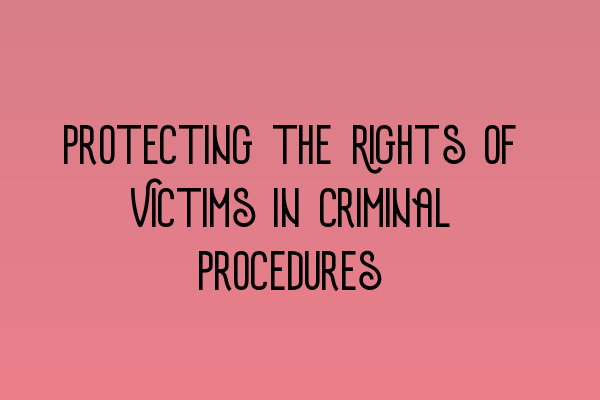Protecting the Rights of Victims in Criminal Procedures
Welcome to the SQE Criminal Law & Practice Law UK blog, where we aim to provide valuable insights and information about criminal law and practice. In this post, we will focus on the important topic of protecting the rights of victims in criminal procedures. Victims play a crucial role in the criminal justice system, and it is essential to ensure that their rights are safeguarded throughout the legal process.
The Role of the Victim in Criminal Proceedings
Before we delve into the specifics of protecting the rights of victims, it is vital to understand the role they play in criminal proceedings. Victims not only experience the direct impact of the crime but also have the right to be informed, heard, and supported throughout the legal process.
In order to provide effective protection to victims, it is important for lawyers and legal professionals to be well-versed in victim rights legislation and the various support services available to them. This knowledge can greatly assist in ensuring that victims are treated with empathy, respect, and fairness.
Protecting the Rights of Victims
There are several key components to protecting the rights of victims in criminal procedures. Let’s explore some of the crucial aspects:
1. Information and Communication
Ensuring that victims are fully informed about their rights, the progress of the case, and the legal proceedings is of utmost importance. Lawyers should establish open lines of communication with their clients and keep them updated throughout the process. By providing clear and concise explanations, victims can make informed decisions and actively participate in the legal proceedings.
2. Legal Representation
Victims have the right to legal representation, and it is essential to ensure that they have access to competent and dedicated lawyers. Legal professionals must have a solid understanding of victim rights legislation and employ appropriate strategies to protect the interests of their clients.
If you are preparing for an SQE 1 exam and want to enhance your knowledge in criminal law and practice, consider taking our SQE 1 Preparation Courses to gain an in-depth understanding of the subject matter.
3. Support Services
Victims often require emotional support and practical assistance to cope with the trauma caused by the crime. Lawyers should be knowledgeable about the support services available to victims, such as counseling, victim advocacy organizations, and financial assistance programs. By connecting victims with the appropriate resources, lawyers can help them navigate the challenging aftermath of the crime.
For more information on SQE 2 preparation courses, consider visiting our SQE 2 Preparation Courses page.
4. Participation and Voice
Empowering victims to actively participate in the criminal proceedings is crucial for ensuring their rights are protected. Lawyers should create an atmosphere where victims feel comfortable expressing their concerns, providing input, and voicing their opinions. This can be achieved through effective communication, active listening, and respectful engagement.
Conclusion
Protecting the rights of victims in criminal procedures is an essential aspect of the criminal justice system. By providing comprehensive information, legal representation, support services, and opportunities for participation, lawyers can effectively safeguard the rights and interests of their clients.
If you are interested in practicing criminal law and want to test your knowledge, we recommend trying our SQE 1 Practice Exam Questions and SQE 1 Practice Mocks FLK1 FLK2. These resources can help you assess your understanding and identify areas for improvement.
Stay updated with the latest SRA SQE exam dates by visiting our SRA SQE Exam Dates page.
We hope this blog post has provided valuable insights into protecting the rights of victims in criminal procedures. If you have any further questions or require legal assistance, feel free to contact SQE Criminal Law & Practice Law UK for expert advice.
